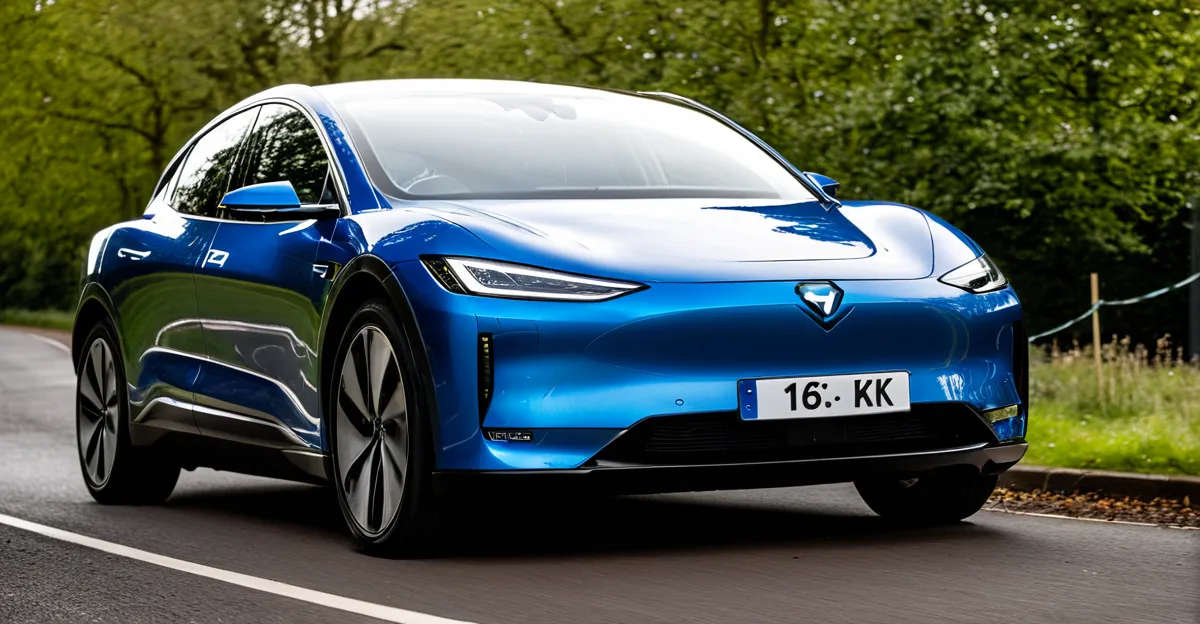Key Trends Shaping the Future of Electric Vehicles in the UK
Understanding the electric vehicle UK market trends is crucial to anticipate the future of EVs in the UK. Currently, there is a notable surge in consumer demand supported by increasing awareness of environmental impact and growing confidence in EV technology. Adoption rates have accelerated as a result of falling battery costs and more affordable EV models entering the market.
Emerging trends include a shift towards vehicles with longer ranges and improved charging speeds, catering to UK consumers’ needs for convenience and efficiency. Additionally, there is a growing interest in electrified commercial vehicles, reflecting the evolving automotive industry’s broader focus on sustainability.
Also read : How Can the UK Automotive Industry Lead in Sustainability Efforts?
Forecasts suggest the UK’s automotive sector will continue to evolve rapidly. Analysts predict that EVs could represent a substantial proportion of all new vehicle sales within the next decade, driven by technological innovation and supportive policy frameworks. Moreover, the rise of connected and autonomous EV models is expected to reshape urban transportation, emphasizing safety and user experience.
Insight into these trends reveals a clear trajectory: the future of EVs in the UK is closely linked to advances in technology, consumer acceptance, and infrastructure improvements. Together, these forces are defining a pivotal transformation phase for the evolving automotive industry.
In parallel : How Can the UK Automotive Industry Innovate to Meet Future Environmental Regulations?
Government Action and Policy Impacting EV Growth
Government EV policies UK play a critical role in shaping the adoption and expansion of electric vehicles across the country. Recent initiatives include significant electric vehicle incentives such as grants for new EV purchases and subsidies for installing home charging points. These incentives aim to lower the upfront cost barrier, making EVs more accessible to a broader range of consumers.
Regulatory impact is evident through evolving legislation that encourages a shift toward zero-emission transport. For instance, the UK government’s commitment to phasing out petrol and diesel vehicle sales by 2030 demonstrates a clear national commitment to sustainability. This policy creates a strong market signal that supports investment in the EV ecosystem and encourages automakers to prioritize electric models.
Key government EV policies UK also include ambitious targets for expanding charging infrastructure, ensuring that electric vehicle owners have convenient access to public charging stations. Additionally, tax incentives such as reduced vehicle excise duty and exemption from congestion charges contribute to improving the total cost of ownership for EV users.
By integrating regulatory measures with financial incentives, the UK government effectively fosters an environment conducive to EV adoption. These policies not only support consumer uptake but also drive growth in the evolving automotive industry, aligning with broader climate objectives and economic goals.
Advances in Electric Vehicle Technology
Electric vehicle technology advancements UK are driving the rapid transformation of the automotive sector. A primary focus has been battery innovation, which significantly improves range capabilities and charging speed. New battery chemistries, such as solid-state designs, promise higher energy density and enhanced safety compared to traditional lithium-ion technology. These improvements address core consumer concerns around range anxiety and charging convenience, both critical for broader electric vehicle adoption UK.
Emerging EV models released by manufacturers specifically target UK market preferences. These models offer a variety of options, from compact urban vehicles to larger family cars, aligning with diverse lifestyles and driving needs across the country. Automakers are also integrating smart features such as advanced driver assistance systems (ADAS), connectivity platforms, and autonomous driving capabilities, all part of forthcoming EV technology advancements UK. These smart functionalities enhance safety, user experience, and overall vehicle efficiency, representing a key evolution in the future of EVs UK.
Additionally, the development of modular and scalable EV platforms allows manufacturers to innovate rapidly while reducing production costs. This technological agility supports the evolving automotive industry by enabling quicker adoption of innovations and more competitive pricing. Collectively, these advancements not only improve vehicle performance but also accelerate the transition to electric mobility across the UK.
Infrastructure Development and Charging Networks
Developing a robust EV charging infrastructure UK is essential to support the accelerating growth of electric vehicles. The expansion of public charging stations addresses a primary consumer concern: the availability and convenience of charging options outside the home. Urban areas, motorway service stations, and retail locations are focal points for this network growth, ensuring accessibility where drivers most require it.
Recent efforts include integrating fast-charging technologies, which significantly reduce charging times. For example, ultra-rapid chargers can replenish an EV battery up to 80% in under 30 minutes, enhancing convenience for long-distance travel and daily use. This technology not only improves user experience but also supports greater EV adoption by reducing range anxiety.
Grid advancements are another critical aspect of EV infrastructure development in the UK. Managing increased electricity demand requires upgrades to the national grid to ensure stability and efficiency. Smart grid technologies enable dynamic load management, balancing the electricity supply with EV charging patterns. These innovations facilitate the integration of renewable energy sources, minimizing the carbon footprint of EV charging.
Together, the evolution of EV charging infrastructure UK, combined with improvements in the grid and fast-charging technologies, lays the foundation for a seamless and practical transition to electric mobility. This infrastructure development is crucial for meeting future demand and supporting the broader objectives of the evolving automotive industry.
Market Forecasts and Data-Driven Insights
Recent electric vehicle adoption statistics in the UK demonstrate a sharp upward trend, with EV sales increasing year-on-year and capturing a growing share of the total vehicle market. According to data, new electric vehicle registrations have risen by over 50% annually in recent years, reflecting strong consumer interest and supportive market conditions. This growth is closely tied to improving affordability and expanding infrastructure.
The UK EV market forecast suggests that electric vehicles will account for a substantial portion of new car sales by 2030, with some analysts projecting EVs could represent more than half of all registrations by the end of the decade. These predictions are supported by ongoing technological advancements and government policies that target a zero-emission future. Expert analysis underscores the importance of sustained investment in battery innovation and charging networks to maintain this growth trajectory.
Market insights also reveal evolving consumer preferences favoring longer range and faster charging capabilities, alongside increased demand for diverse EV models suited to different lifestyles. Visual data often illustrates these forecasts through charts showing exponential growth curves and comparative market shares, helping stakeholders comprehend the pace and scale of change within the evolving automotive industry. This detailed, data-driven perspective provides clarity on how the UK’s electric vehicle sector is set to expand in the near term.
Consumer Behaviour and Adoption Patterns
Consumer decisions around electric vehicle adoption UK are influenced by several key factors. Primarily, the upfront cost of EVs remains a significant barrier, despite decreasing prices due to technological advances. Additionally, concerns about EV charging infrastructure UK—particularly public charging availability and reliability—affect buyer confidence. Many potential buyers worry about access to convenient charging options during daily use or long trips.
Perception also plays a crucial role. Some consumers remain hesitant due to unfamiliarity with EV technology or doubts about vehicle range and performance. Addressing these concerns through education and exposure to positive user experiences is essential for increasing adoption rates.
Shifting demographics show younger and environmentally conscious buyers driving increased demand. This group values sustainability and technological innovation, aligning with the broader future of EVs UK. Market research indicates that as these consumer segments grow, preferences consistently trend toward vehicles offering longer ranges, faster charging, and connectivity features.
Overcoming these barriers requires ongoing improvements in affordability, infrastructure, and public awareness. Effective solutions include continued government incentives and expanded access to fast, reliable charging networks, which together help to build consumer trust and spur wider electric vehicle adoption UK.
Industry Perspectives and Collaborative Initiatives
The automotive industry collaboration in the UK plays a pivotal role in accelerating the transition to electric vehicles. Manufacturers are increasingly forming strategic partnerships to streamline innovation and scale production efficiently. These collaborations often extend beyond automakers, involving government bodies, technology startups, and key players in the EV supply chain UK such as battery producers and charging infrastructure firms.
A central focus of industry partnerships is optimizing the EV supply chain UK to secure critical materials, enhance battery production capacity, and improve logistics. With the growing demand for sustainable mobility solutions, these cooperative efforts address supply risks and drive technological advancements, ensuring the UK remains competitive in the evolving automotive industry.
Experts highlight that future success depends on seamless cooperation between stakeholders. For instance, joint ventures enable shared R&D investments into battery innovation and vehicle software systems. Moreover, collaboration with government initiatives supports policy alignment and investment incentives that foster a conducive business environment.
In summary, robust partnerships in the EV sector are fundamental for scaling up production, reducing costs, and accelerating the future of EVs UK. Industry leaders agree that such collaborations will shape not only manufacturing but also the development of supportive infrastructure and consumer services, collectively driving the UK’s leadership in electric mobility.

